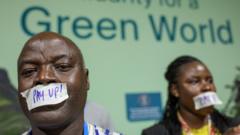The COP29 climate talks concluded with significant divisions over financial commitments, especially from developing nations who have labeled the agreed $300 billion annual funding by 2035 as insufficient. This frustration stemmed from the setback from the current $100 billion, perceived as a meager response to the climate crisis. Indian delegate Chandni Raina articulated the sentiment, calling the arrangement "an optical illusion" and expressing disbelief that richer nations would claim victory when the challenges ahead remain vast.
Developed countries reacted with surprise to the dissatisfaction expressed by their developing counterparts. They cited the upcoming American presidential election and speculated that a future administration under Donald Trump would lead to even less favorable conditions for climate negotiations. Many observers noted the reluctance of wealthier nations to share the financial burden adequately, causing deeper fractures in the climate alliance.
Furthermore, the nature of the hosting country, Azerbaijan, raised concerns, with criticisms directed at its authoritarian governance and reliance on oil exports—a conflict with climate goals. The host nation's president's dismissal of climate concerns in favor of oil revenues left many negotiators disheartened, contributing to one of the more tumultuous gatherings observed in years.
In the midst of the shifting dynamics, China's relatively low-profile participation drew attention. Its role as the largest carbon emitter without formal obligations in emission reductions under UN definitions places it in a complex position. However, its recent willingness to open up regarding climate finance presents an opportunity to assume greater global leadership, filling a possible void left by a retreating United States.
Significantly, civil discontent and activism flourished at COP29, exemplifying a new, more confrontational approach from non-governmental organizations. The shift is indicative of rising tensions and could signal a change in negotiation strategies moving forward, as campaigners called for outright rejection of shallow compromises.
Looking ahead, the next COP will be critical for assessing the durability of emerging leadership roles, the potential realignment of powers in climate negotiations, and the evolution of activist approaches, setting the tone for global climate actions in the coming years.

















